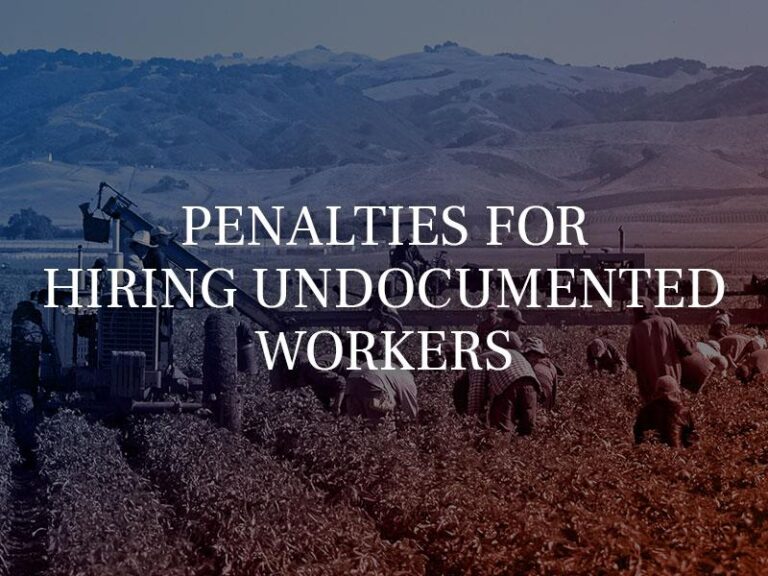Heightened Employer Accountability in Hiring Undocumented Workers: Navigating Legal and Economic Challenges
Intensified Oversight on Employers Amid Escalating Immigration Enforcement
In recent times,government agencies have amplified their efforts to identify and penalize employers who engage undocumented workers. This surge in enforcement includes more frequent and thorough workplace inspections, focusing on compliance with immigration and labour regulations. The shift toward stringent oversight not only increases the risk of financial penalties but also introduces the possibility of criminal charges for non-compliant businesses. Industries heavily dependent on immigrant labor—such as farming, building trades, and the service sector—are especially vulnerable to these enforcement actions.
Notable enforcement measures currently in place include:
- Broadened scope of workplace raids and investigations by immigration officials
- Enhanced scrutiny of employee eligibility verification, especially through mandatory E-Verify usage
- Imposition of fines, suspension of business licenses, and other administrative sanctions
- Coordinated efforts among federal, state, and municipal agencies to share intelligence and streamline enforcement
| Sector | Projected Enforcement Impact | Frequent Compliance Issues |
|---|---|---|
| Farming and Agriculture | Severe | Hiring without authorization, wage and hour violations |
| Construction | Moderate | Incomplete or inaccurate I-9 forms, payroll inconsistencies |
| Hospitality and Food Services | High | Fabricated employment records, off-the-books payments |
Understanding the Legal and Financial Consequences for Employers
Employers who knowingly or unknowingly hire undocumented individuals face a multifaceted array of legal challenges. The Immigration Reform and Control Act (IRCA) mandates strict verification of employee work authorization, and failure to adhere can result in significant monetary fines and legal repercussions. The Department of Homeland Security (DHS) regularly conducts compliance audits, with penalties escalating based on the nature and recurrence of violations. For initial infractions, fines typically range from $275 to $2,750 per unauthorized worker, while repeat offenses can incur fines between $3,000 and $27,000, alongside potential misdemeanor charges in severe cases.
State and local jurisdictions, particularly those with robust immigration enforcement policies like California’s major cities, may impose additional sanctions, including:
- Legal injunctions restricting certain hiring practices
- Revocation or suspension of business licenses and permits
- Reputational harm that can diminish customer trust and community relations
| Violation Category | Penalty for First Violation | Penalty for Subsequent Violations | Additional Consequences |
|---|---|---|---|
| Employment of Unauthorized Workers | $275 – $2,750 | $3,000 – $27,000 | Possible criminal prosecution |
| Failure to Complete or Retain I-9 Forms | $560 – $4,500 | $4,500 – $18,000 | Business license suspension |
| Use of Fraudulent Documents | $3,200 – $11,000 | $6,400 – $16,000 | Operational restrictions |
Effective Verification Techniques to Ensure Workforce Compliance
To mitigate risks associated with undocumented employment, businesses must adopt rigorous verification protocols. Leveraging the E-Verify system provides a swift and reliable method to confirm an employee’s eligibility by cross-referencing federal databases.Maintaining meticulous and current I-9 documentation is equally critical, serving as a safeguard during audits and reinforcing organizational accountability.
Beyond technological tools, ongoing education for human resources teams is essential. Training should focus on the latest immigration regulations, recognizing fraudulent documents, and understanding the nuances of compliance. Establishing clear policies for document review and discrepancy resolution further reduces exposure to violations. Employers can incorporate the following checklist into their hiring procedures:
- Mandatory use of E-Verify for all new hires
- Regular internal audits of I-9 forms and employment records
- Comprehensive training programs for HR and hiring managers
- Clear,documented hiring policies emphasizing legal compliance
- Consultation with legal experts when uncertainties arise
Best Practices to Promote Compliance and Minimize Legal Exposure
Employers seeking to adapt to the evolving regulatory habitat must prioritize thorough verification and documentation processes. Utilizing E-Verify consistently enables immediate confirmation of work authorization, while scheduled internal reviews help identify and correct errors proactively. These measures collectively establish a robust compliance framework that diminishes the likelihood of costly penalties.
Recommended compliance strategies include:
- Conducting mandatory I-9 training sessions for HR staff at least twice a year
- Developing and enforcing clear hiring policies aligned with current federal and state laws
- Updating document verification procedures regularly to reflect legislative changes
- Implementing anonymous reporting channels to encourage employees to report suspicious hiring activities
| Compliance Practice | Advantage | Recommended Frequency |
|---|---|---|
| E-Verify Utilization | Instant eligibility confirmation | Every new hire |
| I-9 Documentation Audits | Identification and correction of errors | Quarterly |
| HR Training Programs | Up-to-date regulatory knowledge | Biannual |
Conclusion: Navigating the Complexities of Immigration Enforcement in Employment
As immigration enforcement policies continue to evolve, employers across multiple industries must remain vigilant in their hiring practices. The increasing collaboration between federal, state, and local authorities signals a future of heightened accountability for businesses employing undocumented workers. Staying informed about regulatory changes and implementing comprehensive compliance strategies are essential steps to mitigate legal and financial risks. This ongoing dynamic highlights the broader dialogue surrounding labor market demands, immigration reform, and the critical role employers play in upholding lawful employment standards.




